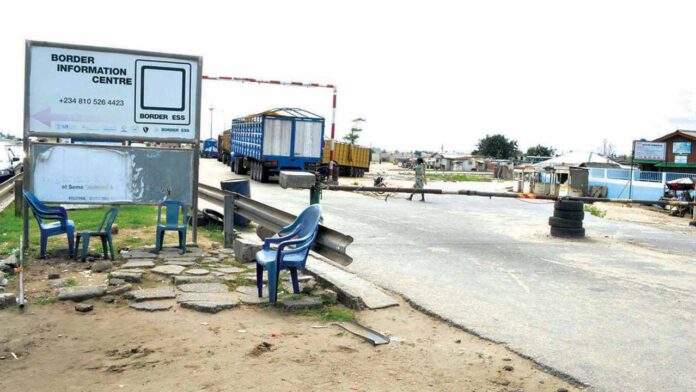Trade and Industry Stakeholders have said the reported re-opening of the borders to allow Dangote and BUA companies to trans-ship their goods across the closed borders was lopsided and amounted to a ‘selective decision’ that would engender monopolies.
Key stakeholders made this assertion in a communique issued on Sunday after a Webinar and Physical “Stakeholders’ Review Meeting on the Recommendations of the Policy Dialogue on Border Closure and Matters Arising”.
The consultative meeting was organised by the National Association of Nigerian Traders (NANTS) in collaboration with GIZ SEDIN-NICOP programme on November 26.
The communique, signed by Dr Ken Ukaoha, NANTS President, noted that the selective re-opening contradicted enshrined general principles and provisions of the recently enacted Federal Competition and Consumer Protection Commission (FCCPC) Act, signed by President Muhammadu Buhari.
Ukaoha said it further contradicted the principles of Ease of Doing Business, a commendable strategy on trade facilitation, which the present administration had been vigorously pursuing.
He said while some operators had noted the implications of the action to the economy, especially within the context of Nigeria’s present status of economic recession, others complained of the inaction concerning goods stranded at the borders, since their closure.
The NANTS president said it also negated and diminished the essence of all financial facilities, incentives and palliatives to MSMEs, including the recent N75 billion MSMEs COVID-19 Survival fund, which the Federal Government had commendably pumped into the system for increased productivity.
“Increased productivity cannot happen without adequate market access opening for originating products to draw from the available ECOWAS market share, for which Nigeria should naturally remain the lead beneficiary. Ultimately, this results in furthering inflation, increase in prices of essential commodities, which would erroneously be blamed on the traders and other private sector operators. We call on government for the immediate re-opening of the land borders to all genuine businesses, and deploying security, employing intelligence sharing, surveillance tactics and trade facilitation lessons learnt during the border closure for effective policing and regulation of the borders and corridors. This will encourage unhindered movement of genuine goods to enhance food security and livelihoods”.
According to him, the continued closure of the borders may increase the devastating food and revenue shortages caused by COVID-19 and compounded by the effects of insecurity, flooding, and other climate change related challenges, on the nation’s food security agenda.
Ukaoha commended the Federal Government for considering the re-opening of land borders after a protracted closure dating back to August 20, 2019, noting that such re-opening would send the right signal to genuine business actors in Nigeria, the entire ECOWAS business community, as well as community citizens on ease of movement.
He added that it would particularly alleviate the traumatic devastation caused by COVID-19 and for which businesses and the economies have remained comatose.
The NANTS president recalled that the original intention of the border closure was to serve, essentially as a warning to smugglers and other criminals using the land borders to perpetrate economic sabotage and insecurity on Nigeria’s socio-economic and political environment.
On this note, he said relevant Security Agencies should by now be able to identify, gather and document enough lessons and drawn strategies to effectively control the borders for the good of the economy and Nigerians as a whole.
Specifically, he appealed to government to speedily revisit all ECOWAS Trade Liberalisation Schemes (ETLS) on approved products like handicrafts, agricultural commodities and livestock products, but consider excluding rice, poultry products, textiles and other related agro-products under prohibition.
Ukoaha said this would further enhance local productivity and market access that could facilitate and fast track the re-awakening of the economy from its current comatose situation.
He further emphasised the need for a clear documentation of the processes, as well as costs and benefits of the border closure, including the lessons learnt and impact, in order to serve as future reference point as well as a platform for learning.
According to him, the documentation will forestall future maladministration of border related operations, and ‘misadventure activities’ by smugglers and other criminal elements operating from Nigeria and neighbouring countries.
The meeting was attended by private sector stakeholders, relevant Civil Society Organisations, as well as key public sector actors involved in trade and competitiveness, particularly, the trade and border enforcement agencies and trade policy makers.

